四级听力:短文理解剖析
四六级考试听力(短文、填空题型及解题技巧)
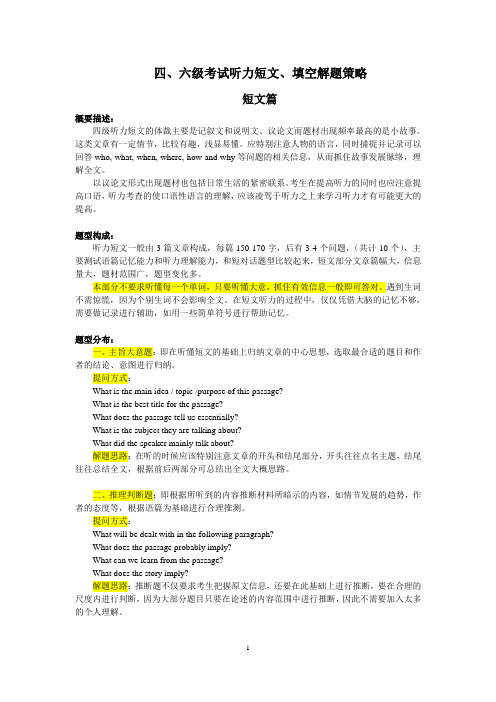
四、六级考试听力短文、填空解题策略短文篇概要描述:四级听力短文的体裁主要是记叙文和说明文、议论文而题材出现频率最高的是小故事。
这类文章有一定情节,比较有趣,浅显易懂。
应特别注意人物的语言,同时捕捉并记录可以回答who, what, when, where, how and why等问题的相关信息,从而抓住故事发展脉络,理解全文。
以议论文形式出现题材也包括日常生活的紧密联系。
考生在提高听力的同时也应注意提高口语,听力考查的使口语性语言的理解,应该凌驾于听力之上来学习听力才有可能更大的提高。
题型构成:听力短文一般由3篇文章构成,每篇150-170字,后有3-4个问题,(共计10个),主要测试语篇记忆能力和听力理解能力,和短对话题型比较起来,短文部分文章篇幅大,信息量大,题材范围广,题型变化多。
本部分不要求听懂每一个单词,只要听懂大意,抓住有效信息一般即可答对。
遇到生词不需惊慌,因为个别生词不会影响全文。
在短文听力的过程中,仅仅凭借大脑的记忆不够,需要做记录进行辅助,如用一些简单符号进行帮助记忆。
题型分布:一、主旨大意题:即在听懂短文的基础上归纳文章的中心思想,选取最合适的题目和作者的结论、意图进行归纳。
提问方式:What is the main idea / topic /purpose of this passage?What is the best title for the passage?What does the passage tell us essentially?What is the subject they are talking about?What did the speaker mainly talk about?解题思路:在听的时候应该特别注意文章的开头和结尾部分,开头往往点名主题,结尾往往总结全文,根据前后两部分可总结出全文大概思路。
二、推理判断题:即根据所听到的内容推断材料所暗示的内容,如情节发展的趋势,作者的态度等,根据语篇为基础进行合理推测。
四级听力短文评析

洛基英语,中国在线英语教育领导品牌Passage One的评析:故事概况(Background):这篇文章讲的是儿童学习语言的能力,该文选自《大学英语听说教程3》(吉林出版集团,该书是我们昂立教育引进补充教材)。
主要内容大致是认为婴儿不仅天生通过模仿和联想学习,也会自行创造语言。
但是他的理论却有局限性,虽然说到孩子们有潜力学,但还是无法解释他们究竟是如何做到的。
解题对策(strategy):第一题问的是交流失败(communication breakdown)的原因,其实答案就是文章的第一句话,世上有很多public,private的语言,并且给出3000, 6000, 6 billion 这样的天文数字。
说明语言数量实在太多,因而沟通会失败。
第二题中Chomsky是著名语言专家,其实再做题时,没有必要了解那么多。
只要快速定位,捕捉文章中的观点词这里由point out以及suggest,在听的过程中只要关注即可迅速选出答案。
最后一题是文章最后一句,由but这个重要结构词引导出it does not explain how children come to use language in particular way. 可以迅速选出答案。
Passage Two 评析:故事概况(Background):这是一篇人物介绍类的文章,说的是一位非常富有背景的警察局长和他开展的社区治安项目的介绍。
解题对策(strategy):第一题是典型的关于文章首句发问,问说话人的目的。
其实只要关注他的第一句话中的关键词即可选出相应选项。
第二题是对于警察局长个人介绍。
需要把握的是一些主要的动词和名词,比如head for 10 years, holds a degree, studied abroad. 关于项目的的话,在文章中部听到the idea behind the program开始切入,这个地道的表达同学们也许不太熟悉,但是听到idea和program时,就应该有感觉,话题开始转变了,所以接下来听的时候更多应该关注program的内容。
2021年9月英语四级听力赏析三篇

2021年9月英语四级听力赏析三篇(2021最新版)作者:______编写日期:2021年__月__日【篇一】2021年9月英语四级听力赏析Believe or not, 43,000,000 Americans are gardening. That is about one in six. Gardeners, of course, come in many varieties. Not surprisingly, most of them are people who live in the suburbs, and enjoy planting flowers, or maybe a small vegetables garden.The average age of gardeners in America is about 45 years old; they usually fall somewhere in the middle class. But the fastest growing groups are city dwellers. Urban residents are finding ways of gardening even in their crowded areas. Many go to large public gardens, as a place designed by the city for garden, and you can actually ranch your own plot.Still other people use their balconies or roof tops, wherever they can find the space to plant small patches of green.Useful Words and Expressions:1. suburb 郊区2. dweller 居民3. ranch 经营牧场4. balcony 阳台5. patch小块地【篇二】2021年9月英语四级听力赏析The history of life on earth has been a history of interaction between living things and their surroundings. To a large extent, the physical fomp3 and the habits of the earth’s vegetation and its animal life have been molded by the environment. Only in the present century has one species of man acquired significant power to alter the nature of his world.The rapidity of change follows the pace of man rather than the pace of nature. Radiation is now the unnatural creation of man’s tampering with the atom. The chemicals are the creations of man’s inventive mind, having no counterparts in nature.We have put poisonous and biologically potent chemicals into the hands of persons largely ignorant of their potentials for hamp3. We have subjected enomp3ous numbers of people to contact with these enomp3ous numbers of people to contact with these poisons, without their consent and often without theirknowledge. We have allowed these chemicals to be used with little or no advance investigation of their effect. Future generations are unlikely to forgive our lack of concern.Useful Words and Expressions:1. interaction 交互作用,交感2. vegetation 植被3. mold 塑造,浇铸4. species 种类5. unnatural 不自然的6. temper with 损害,影响7. counterpart 配对物8. poisonous 有毒的9. potent 有力的,有效的【篇三】2021年9月英语四级听力赏析Why is it so difficult to fall asleep when you are overtired? There is no one answer that applies to every individual. It is possible to feel “tired” physically and still be unable to fall asleep, because while your body may be exhausted, you do not feel sleepy. It is not so easy to simply “turn off”.Lack of sleep complicates matters even more. Experts say adults need at least seven to eight hours of sleep a night to function properly. When you get less sleep than that on consecutive three nights, you begin to accrue four “sleep debt”. As s leep debt increases your body experiences a stress response. Now a vicious cycle has been created: You experience the feeling of being more and more tired, but your body is increasingly stimulated. “Power sleeping” for more hours on weekends is only a temporary solution. There is no substitute for getting a good night’s sleep on a regular basis.Useful Words and Expressions:1. overtire 使过度疲劳2. apply to 将……应用于3. consecutive 连续的,连贯的4. accrue 自然增加,产生5. vicious恶的vicious cycle 恶性循环6. stimulate 刺激,激励7. substitute for 代替……,替换……。
大学英语四级考试听力之短文详解
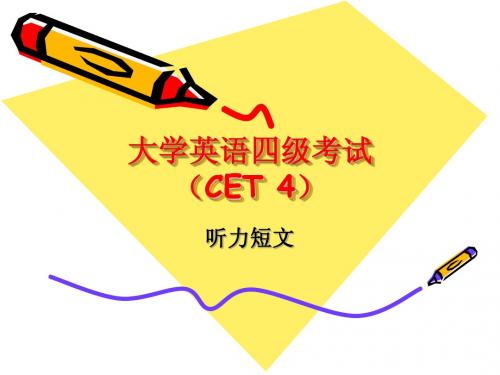
• • • • • • •
科技类说明文 重点注意三个“age”即 advantage 优势 disadvantage 劣势 usage 用途 环境类说明文 重点在于产生环境问题的原因及解决方 法 • 实验类说明文 • 重点在于: • 实验目的 演讲主题、说话人的观点、文章走向 应该重视的原则 听即原则 主题原则 层次原则 原因原 则 转折原则 求异原则 注意事物的与众 不同处 • 替换原则 数字,年代等一般需要重新计算或 定位 • 记叙文的特点及解题技巧 • 记叙文的内容一般为记叙人物经历,故事、 事物发展过程、游记等
• 5.原因原则:凡出现表示原因,目的的很 有可能是考点如:because so as 等词前 后要着重听 • 6.转则原则:凡出现表示转则的词如:but however yet 等,后面的句子往往是考点, 要引起重视 • 7.光明原则:事情一般都是向着好的方面 发展的,主人公多数是大难不死的,事情总 是逢凶化吉,绝处逢生的 • 8.男女原则:同短对话 • 9.穷学生原则:学生一般都是比较穷的, 不能继续学业一般都是因为经济原因,因为 穷一般还比较喜欢DIY一些东西 • 10.偏怪小原则:一般故事总是稀奇古怪的, 经过总是曲折离奇的,结局总是出人意料的。 宗旨就是意料之外、情理之中
• • • • • •
新闻稿类型文章的特点及解题思路 新闻稿的选项特点 1.选项具有时效性 2.选项具有灾难性 新闻稿的文章特点 1.文章叙事的结构有两种:金字塔型和倒金 字塔型。四级听力语段一般为金字塔型,即最 重要的放在最前面,导语引领全文 • 2.注重实效性,在原文和选项中都体现出刚 发生的感觉,有时还会涉及将来时 • 3.内容一般是两大类:天灾,人祸
• 3.因果项标志词 • cause / lead to / contribute to / thanks to / owing to / question / answer / why / reason / 其他形式的问 句 / …… • 4.转折项关键词 • despite / in spite of / instead / while / from ~ to ~ / although ~ (yet)~ / not only ~ but also ~ / …… • 5.序数项标志词 • 所有的序数词(first , second)/ another / the other / next / last / in addition / on the other hand / ……
英语四级听力题型分析及解题技巧
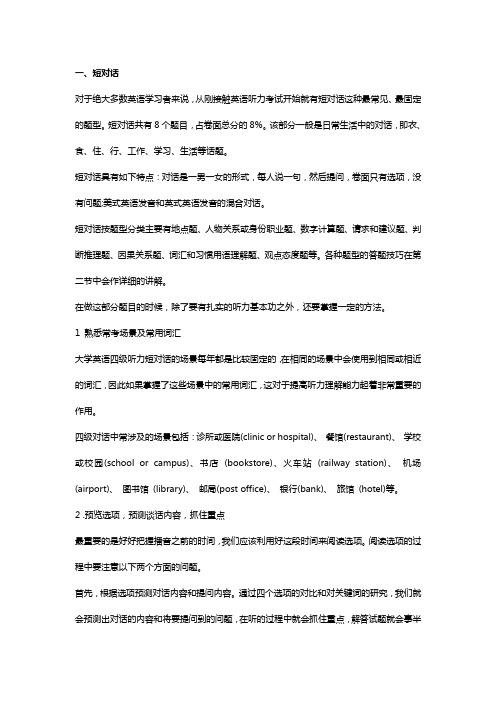
一、短对话对于绝大多数英语学习者来说,从刚接触英语听力考试开始就有短对话这种最常见、最固定的题型。
短对话共有8个题目,占卷面总分的8%。
该部分一般是日常生活中的对话,即衣、食、住、行、工作、学习、生活等话题。
短对话具有如下特点:对话是一男一女的形式,每人说一句,然后提问,卷面只有选项,没有问题;美式英语发音和英式英语发音的混合对话。
短对话按题型分类主要有地点题、人物关系或身份职业题、数字计算题、请求和建议题、判断推理题、因果关系题、词汇和习惯用语理解题、观点态度题等。
各种题型的答题技巧在第二节中会作详细的讲解。
在做这部分题目的时候,除了要有扎实的听力基本功之外,还要掌握一定的方法。
1 熟悉常考场景及常用词汇大学英语四级听力短对话的场景每年都是比较固定的,在相同的场景中会使用到相同或相近的词汇,因此如果掌握了这些场景中的常用词汇,这对于提高听力理解能力起着非常重要的作用。
四级对话中常涉及的场景包括:诊所或医院(clinic or hospital)、餐馆(restaurant)、学校或校园(school or campus)、书店(bookstore)、火车站(railway station)、机场(airport)、图书馆(library)、邮局(post office)、银行(bank)、旅馆(hotel)等。
2 .预览选项,预测谈话内容,抓住重点最重要的是好好把握播音之前的时间,我们应该利用好这段时间来阅读选项。
阅读选项的过程中要注意以下两个方面的问题。
首先,根据选项预测对话内容和提问内容。
通过四个选项的对比和对关键词的研究,我们就会预测出对话的内容和将要提问到的问题,在听的过程中就会抓住重点,解答试题就会事半功倍。
【典型例题】(2006年6月)12. A) The woman does her own housework.B) The woman needs a housekeeper.C) The woman’s house is in a mess.D) The woman works as a housekeeper.显而易见,此题是有关housework的问题,因为四个选项中分别出现了does housework, needs housekeeper, house mess, work as housekeeper;由此推断此题是关于做家务方面的一个谈话,在听这则对话时,就可以轻而易举地对号入座了。
大学英语四级听力题型剖析
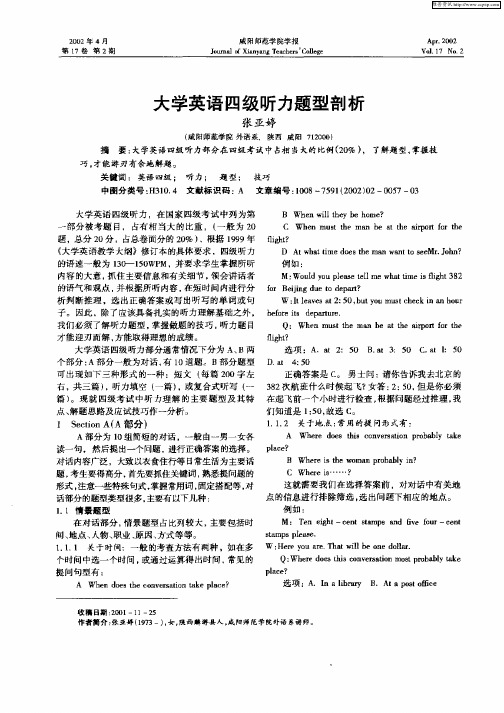
A部分 为 l 组 简短 的对 话 ,一般 由一男 一女各 0 读一句,然后提出一个问题, 进行正确答案的选择。
A W h r d e t i c n e s t n p  ̄ l a e e e o s h s o v rai mb y t k o
pa e lc ?
B h eei e w malpo a l n W r st o l rb by i? h 对话内容广泛,大致以衣食住行等 日 常生活为主要话 C W h r s … ? e e i… 题, 考生要得高分 , 首先要抓住关键词, 熟悉提问题 的 这就 需要 我们 在选 择答案 前 ,对 对话 中有 关地 形式 , 注意—些 特殊 旬式 , 掌握常用词 , 固定搭配 等 , 对 点 的信 息进 行 排除筛 选 , 出问题下 相应 的地点 。 选 话部分 的题型类 型很多 , 有 以下几种 : 主要 例如 : 1 1 情景 题型 . M : T n eg l e t sa s a d f e fu e i h —c l tmp n v o r—c l i et 在对话 部 分 , 景题 型 占比列 较 大 , 情 主要 包括时 s mp la e t a spe s . 间、 点、 地 人物 、 职业 、 因、 原 方式 等等 。 W : r o r h tw l b H o a . He e y u 8 e T a il e O ed l r 11 1 关于 时 闻:一般 的考查 方法有 两种 ,如在多 _. Q: eed e t scn est nm s po a l t e h W r osh o vr i ot rb y a i ao b k 个 时间 中选一 个时 间 , 或通 过运算 得 出时 间 , 常见 的 pa e lc ? 提 问句型有 :
谈四级听力短文理解题解题思路
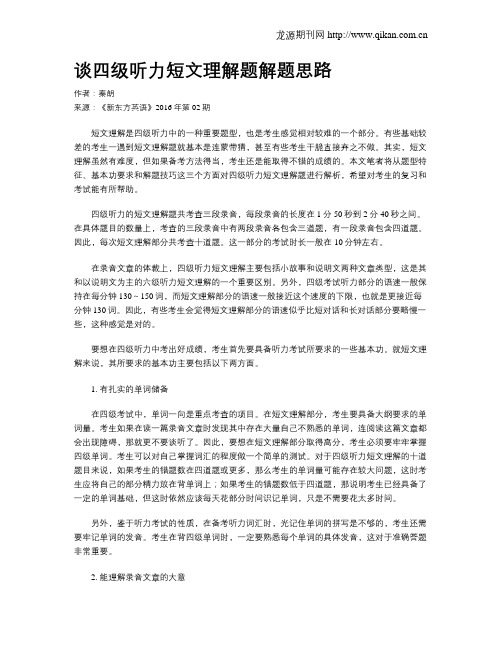
谈四级听力短文理解题解题思路作者:秦朗来源:《新东方英语》2016年第02期短文理解是四级听力中的一种重要题型,也是考生感觉相对较难的一个部分。
有些基础较差的考生一遇到短文理解题就基本是连蒙带猜,甚至有些考生干脆直接弃之不做。
其实,短文理解虽然有难度,但如果备考方法得当,考生还是能取得不错的成绩的。
本文笔者将从题型特征、基本功要求和解题技巧这三个方面对四级听力短文理解题进行解析,希望对考生的复习和考试能有所帮助。
四级听力的短文理解题共考查三段录音,每段录音的长度在1分50秒到2分40秒之间。
在具体题目的数量上,考查的三段录音中有两段录音各包含三道题,有一段录音包含四道题。
因此,每次短文理解部分共考查十道题。
这一部分的考试时长一般在10分钟左右。
在录音文章的体裁上,四级听力短文理解主要包括小故事和说明文两种文章类型,这是其和以说明文为主的六级听力短文理解的一个重要区别。
另外,四级考试听力部分的语速一般保持在每分钟130~150词,而短文理解部分的语速一般接近这个速度的下限,也就是更接近每分钟130词。
因此,有些考生会觉得短文理解部分的语速似乎比短对话和长对话部分要略慢一些,这种感觉是对的。
要想在四级听力中考出好成绩,考生首先要具备听力考试所要求的一些基本功。
就短文理解来说,其所要求的基本功主要包括以下两方面。
1. 有扎实的单词储备在四级考试中,单词一向是重点考查的项目。
在短文理解部分,考生要具备大纲要求的单词量。
考生如果在读一篇录音文章时发现其中存在大量自己不熟悉的单词,连阅读这篇文章都会出现障碍,那就更不要谈听了。
因此,要想在短文理解部分取得高分,考生必须要牢牢掌握四级单词。
考生可以对自己掌握词汇的程度做一个简单的测试。
对于四级听力短文理解的十道题目来说,如果考生的错题数在四道题或更多,那么考生的单词量可能存在较大问题,这时考生应将自己的部分精力放在背单词上;如果考生的错题数低于四道题,那说明考生已经具备了一定的单词基础,但这时依然应该每天花部分时间识记单词,只是不需要花太多时间。
四级真题全面解析
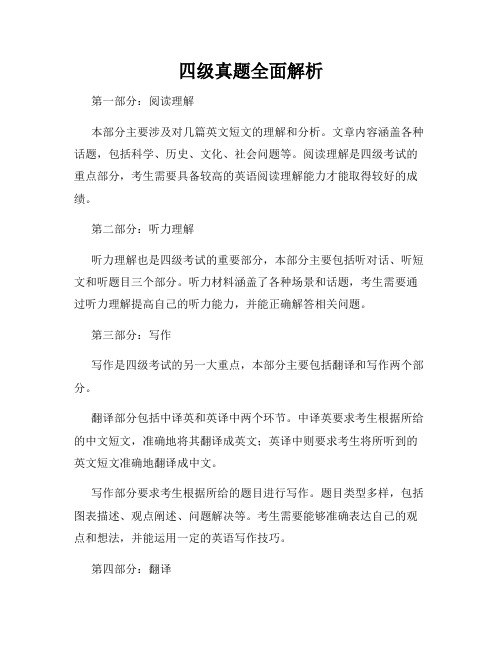
四级真题全面解析
第一部分:阅读理解
本部分主要涉及对几篇英文短文的理解和分析。
文章内容涵盖各种话题,包括科学、历史、文化、社会问题等。
阅读理解是四级考试的重点部分,考生需要具备较高的英语阅读理解能力才能取得较好的成绩。
第二部分:听力理解
听力理解也是四级考试的重要部分,本部分主要包括听对话、听短文和听题目三个部分。
听力材料涵盖了各种场景和话题,考生需要通过听力理解提高自己的听力能力,并能正确解答相关问题。
第三部分:写作
写作是四级考试的另一大重点,本部分主要包括翻译和写作两个部分。
翻译部分包括中译英和英译中两个环节。
中译英要求考生根据所给的中文短文,准确地将其翻译成英文;英译中则要求考生将所听到的英文短文准确地翻译成中文。
写作部分要求考生根据所给的题目进行写作。
题目类型多样,包括图表描述、观点阐述、问题解决等。
考生需要能够准确表达自己的观点和想法,并能运用一定的英语写作技巧。
第四部分:翻译
翻译部分要求考生根据所给的中文句子,准确地将其翻译成英文。
翻译能力是四级考试中的重要环节,也是考察考生语言运用能力的重要方面。
总结:
四级考试是对考生英语综合能力的综合考评,其中包括阅读理解、听力理解、写作和翻译等多个部分。
考生在备考过程中需要注重扩大词汇量,提高听力和阅读能力,掌握一定的写作和翻译技巧。
只有全面提升自己的英语综合能力,才能在四级考试中取得较好的成绩。
总字数:316字。
四级听力短文解码
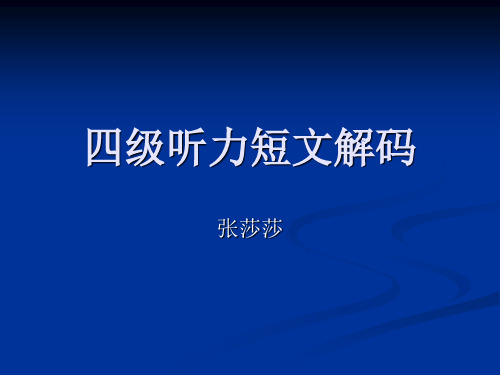
如何预测问题的类型和内容 1.中心思想题 (这类问题主要是测试文章的 主题思想。 ) 提问方式有:What is the main idea of the passage? What can we learn from this passage? What is the best title for this passage? What is the passage mainly about? What is the speaker talking about?等等。
做这一类题时一定要注意集中精力听好短文 的开头,因为四级听力短文一般会开门见山, 把中心思想置于文章的开头。另外,如果文 中反复出现同一词汇或同一类词汇,同样也 值得我们特别注意,因为包含有这类词汇的 选项能较好地体现中心思想,通常就是正确 答案。
2.事实细节题。所考察的细节包括具体时间、 地点、主要人物或事件、各种数字等,问 题一般为wh-question的形式。
选项研究分析
如何阅读选择项 第一步:一定要避免逐词阅读,否则就不可 能在听音前看完选择项。选择项的长短、 简繁不一,具体处理方法也要有所不同。 选择项都比较短时,可采用扫视法。用眼 光扫过选择项,大体了解其内容。当选择 项较长时(B节的选择项往往较长),可 分两步处理。第一步,整体看,以发现其 共同成分;
第二步,采用竖读方法,着重看区别。选择项 (尤其是较长的选择项)各项之间往往有相同的 内容。应先整体扫视选择项,很快发现其共同处, 然后将视线移到各项不同之处进行竖读(即由上 向下看,而不是由左向右看)。用这样的方法看 选择项,开始可能会感到不习惯,因而影响阅读 速度。但经过一段时间的练习,便会习惯。掌握 这种技巧,不仅能加快阅读速度,使我们能在较 短的时间看完较长的阅读项,而且能使我们对选 择项的共同与不同部分印象更深刻,这对确定听 音重点十分重要,因而,在平时就要注意训练提 高这种技巧,使之成为习惯。若平时习惯逐词逐 句地读,考试时就难以纠正,当然就无法熟练运 用这种技巧。需要说明的是,上面所说的只是一 种技巧,不一定适用于所有情况。但快速是原则。
四级听力题目类型介绍

英语四级听力题目的类型包括:
1. 短对话:通常涉及两个人之间的对话,涵盖了日常生活、工作、学习等多个领域。
对话内容较为简单,一般围绕一个话题进行,问题也往往与对话内容密切相关。
2. 长对话:由两个或多个参与者展开的对话,对话内容较长,往往涉及多个话题和信息。
问题也比较复杂,不仅需要考生理解对话的内容,还需要考生分析对话中的细节和隐含意义。
3. 短文理解:一篇短文,长度约为 200 词左右,主要是介绍一些事实、故事、观点等。
问题通常需要考生理解文章的主要内容、细节和主题,并做出选择或判断。
4. 短文听写:要求考生在听完一篇短文后,写下文章的主要内容,包括文章中的细节、句子和单词。
这是四级听力中难度最高的一种题型,需要考生具备较高的听力理解和拼写能力。
5. 复合式听写:在复合式听写中,考生需要在听完一篇短文后,写下文章的主要内容,包括文章中的细节、句子和单词。
同时,考生还需要听懂一段话,然后根据所听到的内容回答问题。
这种题型不仅需要考生具备较高的听力理解和拼写能力,还需要考生具备较强的问题分析和解答能力。
以上是英语四级听力题目的主要类型,每种类型都有其独特的难度和特点,需要考生在平时的学习和练习中逐步提高自己的听力水平和答题能力。
月四级听力与分析文本
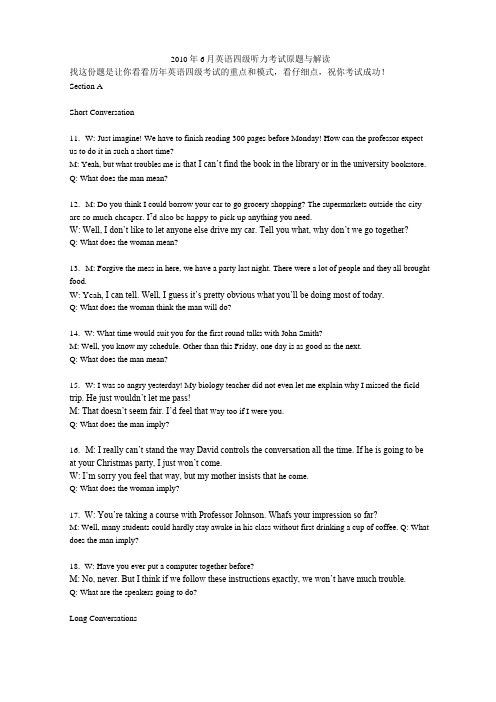
2010年6月英语四级听力考试原题与解读找这份题是让你看看历年英语四级考试的重点和模式,看仔细点,祝你考试成功!Section AShort Conversation11.W: Just imagine! We have to finish reading 300 pages before Monday! How can the professor expect us to do it in such a short time?M: Yeah, but what troubles me is that I can’t find the book in the library or in the university bookstore. Q: What does the man mean?12.M: Do you think I could borrow your car to go grocery shopping? The supermarkets outside the city are so much cheaper. I7d also be happy to pick up a nything you need.W: Well, I don’t like to let anyone else drive my car. Tell you what, why don’t we go together?Q: What does the woman mean?13.M: Forgive the mess in here, we have a party last night. There were a lot of people and they all brought food.W: Yeah, I can tell. Well, I guess it’s pretty obvious what you’ll be doing most of today.Q: What does the woman think the man will do?14.W: What time would suit you for the first round talks with John Smith?M: Well, you know my schedule. Other than this Friday, one day is as good as the next.Q: What does the man mean?15.W: I was so angry yesterday! My biology teacher did not even let me explain why I missed the field trip. He just wouldn’t let me pass!M: That doesn’t seem fair. I’d feel that w ay too if I were you.Q: What does the man imply?16.M: I really can’t stand the way David controls the conversation all the time. If he is going to be at your Christmas party, I just won’t come.W: I’m sorry you feel that way, but my mother insists that he come.Q: What does the woman imply?17.W: You’re taking a course with Professor Johnson. Whafs your impression so far?M: Well, many students could hardly stay awake in his class without first drinking a cup of coffee. Q: What does the man imply?18.W: Have you ever put a computer together before?M: No, never. But I think if we follow these instructions exactly, we won’t have much trouble.Q: What are the speakers going to do?Long ConversationsConversation 1W: What sort of hours do you work, Steve?M: Well I have to work very long hours, about eleven hours a day.W: What time do you start?M: I work 9 to 3, then I start again at 5:30 and work until 11, six days a week. So I have to work very unsocial hours.W: And do you have to work at the weekend?M: Oh, yes, that’s our busiest time. I get Wednesdays off.W: What are the things you have to do and the things you don’t have to do?M: Uh, I don’t have to do the washing -up, so thafs good. I have to wear white, and I have to keep everything in the kitchen totally clean.W: Whafs hard about the job?M: You are standing up all the time. When we are busy, people get angry and sharp, but that’s normal.W: How did you learn the profession?M: Well, I did a two-year course at college. In the first year we had to learn the basics, and then we had to take exams.W: Was it easy to find a job?M: I wrote to about six hotels and one of them gave me my first job, so I didn’t have to wait too long. W: And what’s the secret of being good at your job?M: Attention to detail. You have to love it. You have to show passion for it.W: And what are your plans for the future?M: I want to have my own place when the time is right.Q19. What does the man say about his job?Q 20. What does the man think is the hardest part of his job?Q 21. Where did the man get his first job after graduation?Q 22. What does the man say is important to being good at his job?Conversation 2W: Now you’ve seen this table of figures about the pocket money children in Britain get?M: Yes. I thought it was quite interesting, but I don’t quite understand the column entitled change. Can you explain what it means?W: Well, I think it means the change from the year before. I am not a mathematician, but I assume the rise from 70p to 90p is a rise of 25 percent.M: Oh yes, I see. And the inflation rate is there for comparison.W: Yes. why do you think the rise in pocket money is often higher than inflation?M: I am sorry I’ve no idea. Perhaps parents in Britain are too generous.W: Perhaps they are. But it looks as if children were not better off in 2001 than they were in 2002. Thafs strange, isn’t it? And they seem to have been better off in 2003 than they are now. I wonder why that is.M: Yes, I don’t understand that at all.W: Anyway, if you had children, how much pocket money would you give them?M: I don’t know. I think I’ll probably give them 2 pounds a week.W: Would you? And what would you expect them to do with it?M: Well, out of that, they have to buy some small personal things, but I w ouldn’t expect them to save to buy their own socks, for example.W: Yes, by the way, do most children in your country get pocket money?M: Yeah, they do.Q23 What is the table of figures about?Q24 What do we learn from the conversation about British chil dren’s pocket money?Q25 Supposing the man had children, what would he expect them to do with their pocket money?Section BPassage 1As the new sales director for a national computer firm, Alex Gordon was looking forward to his first meeting with the company’s district managers. Everyone arrived on time, and Alex’s presentation went extremely well. He decided to end the meeting with the conversation about the importance of the district managers to the company’s plans. “I believe we are go ing to contin ue to increase our share of the market,” he began, “because of the quality of the people in this room.The district manager is the key to the success of the sales representatives in his district. He sets the term for everyone else. If he has ambitious goals and is willing to put in long hours, everyone in his unit will follow his example." When Alex was finished, he received polite applauses, but hardly the warm response he had hoped for. Later he spoke with one of the senior managers. “Things were going so well until the end", Alex said disappointedly. “Obviously, I said the wrong thing." “Yes”,the district manager replied. “Half of our managers are women. Most have worked their way up from sales representatives, and they are very proud of the role they played in the company’s growth. They don’t care at all about political correctness. But they were definitely surprised and distressed to be referred to as ‘he’ in your speech."Q26 Who did Alex Gordon speak to at the first meeting?Q27 What did Alex want to emphasize at the end of his presentation?Q28 What do we learn about the audience at the meeting?Q29 Why did Alex fail to receive the warm response he had hoped for?Passage 2The way to complain is to act business-like and important. If your complaint is immediate, suppose you got the wrong order at a restaurant, make a polite but firm request to see the manager. When the manager comes, ask his or her name. And then state your problem and what you expect to have done about it. Be polite! Shouting or acting rude will get you nowhere. But also be firm in making your complaint. Besides, act important. This doesn’t mean to put on airs and say “do you know who I am?” What it means is thatpeople are often treated the way they expect to be treated. If you act like someone who expects a fair request to be granted, chances are it will be granted. The worst way to complain is over the telephone. You are speaking to a voice coming from someone you cannot see. So you can’t tell how the person on the line is reactin g. It is easy for that person to give you the run-around. Complaining in person or by letter is generally more effective. If your complaint doesn’t require an immediate response, it often helps to complain by letter. If you have an appliance tha t doesn’t w ork, send a letter to the store that sold it. Be business-like and stick to the point. Don’t spend a paragraph on how your uncle John tried to fix the problem and couldn’t.Q30 What does the speaker suggest you do when you are not served properly at a restaurant? Q31 Why does the speaker say the worst way to complain is over the telephone?Q32 What should you do if you make a complaint by letter?Passage 3Barbara Sanders is a wife and the mother of two children, ages 2 and 4. Her husband, Tom, is an engineer and makes an excellent salary. Before Barbara had children, she worked as an architect for the government, designing government housing. She quit her job when she became pregnant, but is now interested in returning to work. She's been offered an excellent job with the government. Her husband feels it's unnecessary for her to work since the family does not need the added income. He also thinks that a woman should stay home with her children. If Barbara feels the need to do socially important work, he thinks that she should do volunteer work one or two days a week. Barbara, on the other hand, has missed the excitement of her profession and does not feel she would be satisfied doing volunteer work. She would also like to have her own income, so she does not have to ask her husband for money whenever she wants to buy something. She does not think it's necessary to stay home every day with the children and she knows a very reliable babysitter who's willing to come to her house. Tom does not think a babysitter can replace a mother and thinks it's a bad idea for the children to spend so much time with someone who's not part of the family.Q33 What was Barbara's profession before she had children?Q34 What does Barbara's husband suggest she do if she wants to work? Q35 What does Tom think about hiring a babysitter?Section CAlmost every child, on the first day he sets foot in the school building, is smarter, more curious , less afraid of what he doesn't know, better at finding and figuring things out, more confident, resourceful, persistent and independent, than he will either be again in his schooling or, unless he is very unusual and very lucky, for the rest of his life.Already, by paying close attention to and interacting with the world and people around him, and without any school-type formal instruction, he has done a task far more difficult, complicated and abstract than anything he will be asked to do in school, or than any of his teachers has done for years-he has solved the mystery of language. He has discovered it. Babies don't even know that language exists.And he has found out how it works and learnt to use it appropriately. He has done it by exploring, by experimenting, by developing his own model of the grammar of language, by trying it out and seeing whether it works, by gradually changing it and refining it until it does work.And while he has been doing this, he has been learning other things as well, including many of the concepts that the schools think only they can teach him, and many that are more complicated than the ones they do try to teach him.短对话11. C He can not get access to the assigned book.12. A She will drive the man to the supermarket.13. C Tidy up the place.14. A The talks can be held any day except Friday.15. A He understands the woman's feelings.16. D She has to invite David to the party.17. C Many students find Prof. Johnson's lectures boring.18. D Assemble the computer.长对话19. B It requires him to work long hours.20. D It demands physical endurance and patience.21. D In a hotel.22. B Paying attention to every detail.23. A The pocket money British children get.24. C It often rises higher than inflation.25. B Pay for small personal things.段子题26. A District managers.27. D The important part played by district managers.28. B Fifty percent of them were female.29. B He was not gender sensitive.30. C Ask to see the manager politely but firmly.31. D You can't tell how the person on the line is reacting.32. D Stick to the point.33. B Architect.34. A Do some volunteer work.35. A Few baby-sitters can be considered trustworthy.听写36.Curious37.Figuring38.Independent39.Interacting40.Formal41.Abstract42.Mystery43.he has found out how it works and learnt to use it appropriately.44.by trying it out and seeing whether it works, by gradually changing it and refining it45.including many of the concepts that the schools think only they can teach him,详细解读11.C) He cannot get access to the assigned book.由对话可知,该男士认为令他烦恼的是无论是在图书馆还是在书店他都找不到那本书,由此得出答案。
英语四级短文听力理解

4、主题原则:主题一般出现在段落的头尾部分,所以 1、听即原则:所听即所选(正好与短对话相反)。
A、结构严谨,一段一个方面:段首和段尾句常就是题解。 • According to the passage, when/ where/ how/ why/ what …?
要集中精力听清前三句话和最后两句话. 7、转折原则:凡出现表折则的词,后面的句子往往是考点。
因引起重视。如果选项中出现,很可能是正确答案. whereas/while, on the other hand, on the contrary, in/by contrast
B、故事六要素;
对较客观(说明、议论)的文章,若未听清原文,可据问题凭借常识答题。
3、题文同序原则:出题顺序一般与行文顺序相同,除 内容包括具体人名、地名、时间、地点、各种数字、原因、结果、目的等。
考察题型
1. 主旨大意题 考察对全文的理解,常对短文的中心思想、主题
或标题的提问。
2. 信息明示题(频率最高) 考察具体事实。内容包括具体人名、地名、时间、
地点、各种数字、原因、结果、目的等。
3. 推断题: (较难但频率低) 考察推理判断能力。要根据材料提供的信息做出
合理的推测和正确的判断。
主旨大意题 主要提问方式 • What is the main idea of the passage? • What can we learn from this passage? • Which of the following statements best expresses the main idea of the passage?
推断题
对较客观(说明、议论)的文章,若未听清原文,可据问题凭借常识答题。
大学英语四级听力材料及答案解析

大学英语四级听力材料及答案解析不论大学时心情低落或高涨,对于英语四级的听力都不能够懈怠。
下面是店铺给大家整理的大学英语四级听力材料及答案解析,供大家参阅!大学英语四级听力材料及答案解析听力真题:Section BPassage One26.A. In green forests.B. In dry deserts.C. In the Pacific Ocean.D. In the North Pole region.27.A. Snakes like to stay in the sun.B. Snakes like warmth.C. Snakes are used to extra-hot weather.D. Snakes are good swimmers.28.A. They are very intelligent.B. They are the most intelligent.C. They are more intelligent.D. They are less intelligent.答案解析:Section BPassage One[26]Snakes may be found just about everywhere except the North Pole region and some islands in the South Pacific Ocean. Some snakes live in warm, dry deserts. Others live in green forests,fields and woodlands. Some never go far from water and are fine swimmers. Some live all their lives in the sea. Most snakes can swim. [27]Because snakes are cold-blooded and depend on warm air for comfort and existence, the largest number of snakes is found in the hottest parts of the earth. Even so, many snakes stay away from the direct rays of the sun when possible. If extra hot weather comes along, snakes find a coolest place possible and stay there. In places where it freezes, snakes often hide themselves far under the ground or in caves and stay until spring. Snakes are smart enough to stay alive. They are smart enough to find food and kill their enemies. [28]But compared with other animals, they are believed to be below average in intelligence.Questions 26 to 28 are based on the passage you have just heard.26. In which of the following places have snakes never been found?正确答案:D解析:短文开头就提到,除了北极地区和南太平洋的一些岛屿外,到处都有蛇类。
四级考试听力题型破解:短文理解
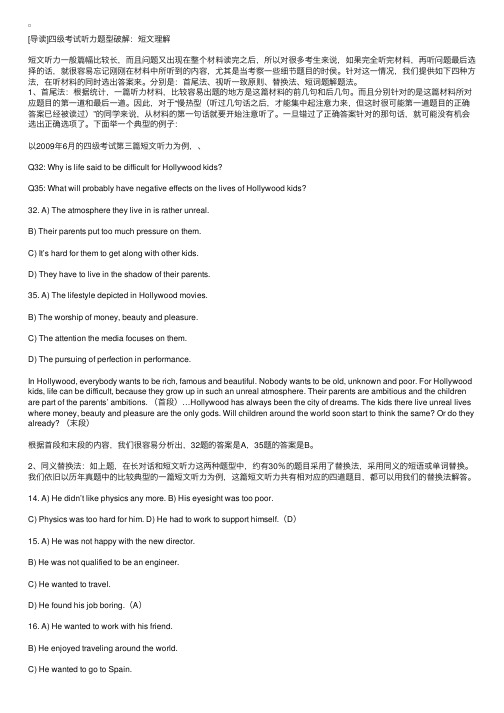
[导读]四级考试听⼒题型破解:短⽂理解短⽂听⼒⼀般篇幅⽐较长,⽽且问题⼜出现在整个材料读完之后,所以对很多考⽣来说,如果完全听完材料,再听问题最后选择的话,就很容易忘记刚刚在材料中所听到的内容,尤其是当考察⼀些细节题⽬的时侯。
针对这⼀情况,我们提供如下四种⽅法,在听材料的同时选出答案来。
分别是:⾸尾法、视听⼀致原则、替换法、短词题解题法。
1、⾸尾法:根据统计,⼀篇听⼒材料,⽐较容易出题的地⽅是这篇材料的前⼏句和后⼏句。
⽽且分别针对的是这篇材料所对应题⽬的第⼀道和最后⼀道。
因此,对于“慢热型(听过⼏句话之后,才能集中起注意⼒来,但这时很可能第⼀道题⽬的正确答案已经被读过)”的同学来说,从材料的第⼀句话就要开始注意听了。
⼀旦错过了正确答案针对的那句话,就可能没有机会选出正确选项了。
下⾯举⼀个典型的例⼦:以2009年6⽉的四级考试第三篇短⽂听⼒为例,、Q32: Why is life said to be difficult for Hollywood kids?Q35: What will probably have negative effects on the lives of Hollywood kids?32. A) The atmosphere they live in is rather unreal.B) Their parents put too much pressure on them.C) It’s hard for them to get along with other kids.D) They have to live in the shadow of their parents.35. A) The lifestyle depicted in Hollywood movies.B) The worship of money, beauty and pleasure.C) The attention the media focuses on them.D) The pursuing of perfection in performance.In Hollywood, everybody wants to be rich, famous and beautiful. Nobody wants to be old, unknown and poor. For Hollywood kids, life can be difficult, because they grow up in such an unreal atmosphere. Their parents are ambitious and the children are part of the parents’ ambitions. (⾸段)…Hollywood has always been the city of dreams. The kids there live unreal lives where money, beauty and pleasure are the only gods. Will children around the world soon start to think the same? Or do they already? (末段)根据⾸段和末段的内容,我们很容易分析出,32题的答案是A,35题的答案是B。
大学英语四级考试听力篇章分析

4.推理推测题。
• 这类题需要对文中的信息进展分析推断, 才能作出正确的选择。提问方式有:
What can be infer from the passage What does the speaker think about the problem...
• What does the speaker most concerned about
2.事实细节题。
• 所考察的细节包括具体时间、地点、主 要人物或事件、各种数字等,问题一般 为wh-question的形式。
• According to the passage 1why/ 2what /3when /4how/5where/6how long
• 这类题要求我们听到文中出现时间、数 字时一定要特别敏感,及时做好笔记; 另外,文中一旦出现以因果连词(如 because, so, due to等)和转折连词(如but, however, though等)引导的句子也要格外 留心,这些地方往往就是考点。
注意舍得放弃,不要停留。
• 预测选项,结合排除法选择答案: 利用播放考试指令的时间以及两个问题间的停 顿,快速抢读选项,预测短文的体裁和内容, 再根据不同体裁短文的不同提问方式,进一步 预测可能提的问题。原文重现和同义解释的内 容一般就是文章的答案。
原文重现:短文中的四个选项有一个会在原文 中间被重新念一遍,最先听到的就是正确的
大学英语四级考试听力篇章分析
一. 主要内容:
• 社会问题:social issues 妇女解放运动 民族问题 劳动就业 能源 污染 住房 交通 卫生 一般知识:common sense 文化教育 风土人情 节假日 历史事件 法律 宗教 文学与艺术 科普知识:popular science 新奇的,时髦的科普知识介绍或实验成果及其应用的介绍。 人物传记:biography 历史人物或者名人轶事的介绍
四级听力:短文理解详解

三、听力短文十大主题
5. 特殊机构及西方文化介绍文(说明文)
内容:办事服务机构(银行、餐厅等)、科技研究中心、法 庭或监狱、图书馆图书流通服务、交通通讯方式、音乐剧、 好莱坞电影、芭蕾舞等方面。 结构: (1) 机构类:某机构总部所在国家或城市;机构的基本特 点及规章制度要求;机构之所以闻名的原因或独特之处;机 构的工作方式、效率及给某特殊群体带来的便利。 (2) 服务类:某种服务的开办地点及目的;服务类型之所 以闻名的原因或独特之处;服务的分类、分类标志、工作人 员组成;服务的工作方式、效率及给某特殊群体带来的便利 (经常用数字说明)。 (3) 艺术类:某种文化艺术形式的普及性;文化艺术形式 的独特之处;文化艺术形式的创作人员、参与者及参与原因。
一、听力短文五大命题特点
1. 形似阅读理解,难度相差悬殊。听力短文在形式上与阅读理解 基本相同,但听力短文材料的难度比阅读理解小得多,只相当于 一般的口语材料。因此考生完全没有必要被其外在形式吓倒。 2. 短文播放时间固定,但有弹性时间可利用。播放听力录音之前 有大约90秒的试音时间,且在播放短文之前要播放本题的指令部 分(directions),这些时间都是可以利用的。 3. 短文体裁较为固定,为做出正确判断提供了语境依据。听力短 文多为说明文或叙述性小故事,材料较为通俗易懂,这使提前根 据所给选项推断材料内容成为可能。 4. 选项已知,可作为推断短文内容的依据。考生可以根据选项所 提供的信息,利用前面提到的弹性时间进行推断,为充分获取短 文信息创造更加有利的条件。 5. 各小题类型相对固定,有助于总结答题规律。多年来听力短文 的试题类型是相对固定的,主要包括主旨题、细节题、态度题、 判断题、推理题等,这给我们正确解题提供了启发和思路。
2012年6月大学英语四级真题听力部分原文及解析
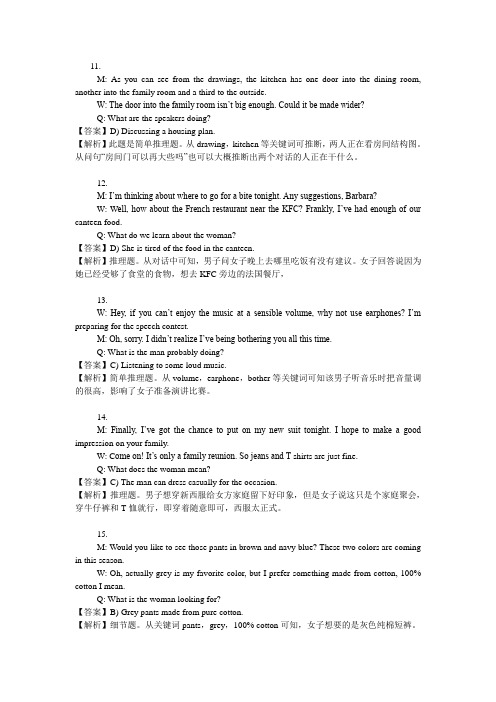
11.M: As you can see from the drawings, the kitchen has one door into the dining room, another into the family room and a third to the outside.W: The door into the family room isn’t big enough. Could it be made wider?Q: What are the speakers doing?【答案】D) Discussing a housing plan.【解析】此题是简单推理题。
从drawing,kitchen等关键词可推断,两人正在看房间结构图。
从问句“房间门可以再大些吗”也可以大概推断出两个对话的人正在干什么。
12.M: I’m thinking about where to go for a bite tonight. Any suggestions, Barbara?W: W ell, how about the French restaurant near the KFC? Frankly, I’ve had enough of our canteen food.Q: What do we learn about the woman?【答案】D) She is tired of the food in the canteen.【解析】推理题。
从对话中可知,男子问女子晚上去哪里吃饭有没有建议。
女子回答说因为她已经受够了食堂的食物,想去KFC旁边的法国餐厅,13.W: Hey, if you can’t enjoy the music at a sensible volume, why not use earphones? I’m preparing for the speech contest.M: Oh, sorry. I didn’t realize I’ve being bothering you all this time.Q: What is the man probably doing?【答案】C) Listening to some loud music.【解析】简单推理题。
四级听力 如何把握短文主旨(10)
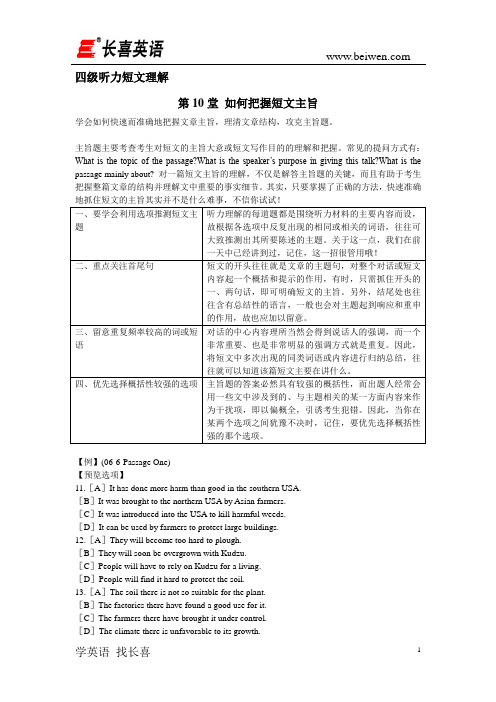
四级听力短文理解第10堂如何把握短文主旨学会如何快速而准确地把握文章主旨,理清文章结构,攻克主旨题。
主旨题主要考查考生对短文的主旨大意或短文写作目的的理解和把握。
常见的提问方式有:What is the topic of the passage?What is the speaker’s purpose in giving this talk?What is the passage mainly about? 对一篇短文主旨的理解,不仅是解答主旨题的关键,而且有助于考生把握整篇文章的结构并理解文中重要的事实细节。
其实,只要掌握了正确的方法,快速准确地抓住短文的主旨其实并不是什么难事,不信你试试!一、要学会利用选项推测短文主题听力理解的每道题都是围绕听力材料的主要内容而设,故根据各选项中反复出现的相同或相关的词语,往往可大致推测出其所要陈述的主题。
关于这一点,我们在前一天中已经讲到过,记住,这一招很管用哦!二、重点关注首尾句短文的开头往往就是文章的主题句,对整个对话或短文内容起一个概括和提示的作用,有时,只需抓住开头的一、两句话,即可明确短文的主旨。
另外,结尾处也往往含有总结性的语言,一般也会对主题起到响应和重申的作用,故也应加以留意。
三、留意重复频率较高的词或短语对话的中心内容理所当然会得到说话人的强调,而一个非常重要、也是非常明显的强调方式就是重复。
因此,将短文中多次出现的同类词语或内容进行归纳总结,往往就可以知道该篇短文主要在讲什么。
四、优先选择概括性较强的选项主旨题的答案必然具有较强的概括性,而出题人经常会用一些文中涉及到的、与主题相关的某一方面内容来作为干扰项,即以偏概全,引诱考生犯错。
因此,当你在某两个选项之间犹豫不决时,记住,要优先选择概括性强的那个选项。
【例】(06-6-Passage One)【预览选项】11.[A]It has done more harm than good in the southern USA.[B]It was brought to the northern USA by Asian farmers.[C]It was introduced into the USA to kill harmful weeds.[D]It can be used by farmers to protect large buildings.12.[A]They will become too hard to plough.[B]They will soon be overgrown with Kudzu.[C]People will have to rely on Kudzu for a living.[D]People will find it hard to protect the soil.13.[A]The soil there is not so suitable for the plant.[B]The factories there have found a good use for it.[C]The farmers there have brought it under control.[D]The climate there is unfavorable to its growth.【预测信息】预览三道题各选项,由farmers, soil, plant, growth等词以及12题中的Kudzu一词,可推知本文很可能是对一种名为“Kudzu”的植物的介绍。
- 1、下载文档前请自行甄别文档内容的完整性,平台不提供额外的编辑、内容补充、找答案等附加服务。
- 2、"仅部分预览"的文档,不可在线预览部分如存在完整性等问题,可反馈申请退款(可完整预览的文档不适用该条件!)。
- 3、如文档侵犯您的权益,请联系客服反馈,我们会尽快为您处理(人工客服工作时间:9:00-18:30)。
三、听力短文十大主题
(3)理论类:自然界中某个神秘现象的发生;科学 家的理论内容;用理论阐释现象的成因或规律。 (4)发明类:人类生活中的局限;发明家进行的努 力;发明成功的年代;发明的工作原理、操作步骤 或功能效果。 关键词:science, astronomy, spaceman, technology, design, program, chemical, explore, agriculture, fertilizer, hurricane, typhoon, surgery, euthanasia
一、听力短文五大命题特点
1. 形似阅读理解,难度相差悬殊。听力短文在形式上与阅读理解 基本相同,但听力短文材料的难度比阅读理解小得多,只相当于 一般的口语材料。因此考生完全没有必要被其外在形式吓倒。 2. 短文播放时间固定,但有弹性时间可利用。播放听力录音之前 有大约90秒的试音时间,且在播放短文之前要播放本题的指令部 分(directions),这些时间都是可以利用的。 3. 短文体裁较为固定,为做出正确判断提供了语境依据。听力短 文多为说明文或叙述性小故事,材料较为通俗易懂,这使提前根 据所给选项推断材料内容成为可能。 4. 选项已知,可作为推断短文内容的依据。考生可以根据选项所 提供的信息,利用前面提到的弹性时间进行推断,为充分获取短 文信息创造更加有利的条件。 5. 各小题类型相对固定,有助于总结答题规律。多年来听力短文 的试题类型是相对固定的,主要包括主旨题、细节题、态度题、 判断题、推理题等,这给我们正确解题提供了启发和思路。
三、听力短文十大主题
内容:环境污染、资源短缺、人口爆炸、交通阻 塞、犯罪现象、吸毒、离婚、自杀等方面的内容。 结构: ·灾难危机的类型及人类的忧虑; ·灾难危机的起因、严重程度及危害; ·人类的对策、解决方法。 关键词:society, crime, assassinate, economy, out of work, corruption, welfare, finance, insurance, traffic jam, customer’s house, moral, disease, flu
由于说明文所涉及的内容相当广泛,考生应注意平时多阅读、多
积累,扩大自己的知识面,尤其要注意西方文化与本国文化不同 的地方,以及科学技术的新发展、新变化。
文化教育类和社会制度类短文虽然题材广泛,内容通俗易懂,句 型结构较简单。可通过篇首或篇尾的主题句推测文章内容。
科普研究类文章往往是考生比较陌生的话题,句型结构较复杂, 也会经常出现生僻词。但是此类文章的题目一般都较简单,细节 题较多,考生可边听边看题目选项,捕获关键信息,放弃无关紧
2. 事实细节题
五、短文听力五大提问方式
3. 情感态度题
态度题的选项往往是四个形容词,所以考生在播 放短文录音之前判断出有态度题,在听录音时就 应特别留心fortunately, luckily, unfortunately 等这样的具感情色彩的可以反映出speaker的态 度的词。 speaker对于谈论的对象可能有双向评论,如果 听不出speaker的态度方向,建议同学们选正面 态度的,因为反驳的文章往往更为复杂。
三、听力短文十大主题
9. 实验和调查研究文
内容:国外某大学进行的一项特殊调查、实验、 研究或统计,以及由此研究或实验、调查得出的 结论或存在的争议。 结构: ·用一个日常生活事实引出话题; ·描述某大学进行的调查实验:数据统计、目的及结 果; ·对结果进行分析,得出相关推论; ·实验结果的合理性及局限性,专家对此结论的看 法。
四、听力短文六大设提点
1.首尾处 2.列举和举例处 3.并列、转折、因果、条件等逻辑关系 4.强调的地方 5.比较处 6.含有年代、数量、价格等数字的地方
五、短文听力五大提问方式
提问方式: What is the main idea of the passage? What can we learn from this passage? What is the best title for this passage? What is the passage mainly about? What is the speaker talking about? 技巧: 一、留意首尾处:主题句一般在开头或结尾 二、根据各题选项推测主题 三、留意重复频率较高的词或短语
7. 灾难危机分析文
三、听力短文十大主题
8. 大学课堂讲座文
内容:由某权威人物讲授某个领域的相关知识, 或对某一现象进行评论。 结构: ·讲座发言人自我介绍、提出讲座主题; ·某个领域的问题、发展状况、有趣的概念术语 (经常用数据说明); ·最具代表性的专家、事例、结论及原因; ·此领域的发展前景,有可能引出下次课讨论的话题。
五、短文听力五大提问方式
5. 推理推测题
五、短文听力五大提问方式
4. 对错判断题
提问方式: Which of the following is true/not true, according to the passage? Which of the following is not mentioned? 一定要听清提问,对于有没有not一词要弄清楚。 一般情况下,not一词会重读。
三、听力短文十大主题
5. 特殊机构及西方文化介绍文(说明文)
内容:办事服务机构(银行、餐厅等)、科技研究中心、法 庭或监狱、图书馆图书流通服务、交通通讯方式、音乐剧、 好莱坞电影、芭蕾舞等方面。 结构: (1) 机构类:某机构总部所在国家或城市;机构的基本特 点及规章制度要求;机构之所以闻名的原因或独特之处;机 构的工作方式、效率及给某特殊群体带来的便利。 (2) 服务类:某种服务的开办地点及目的;服务类型之所 以闻名的原因或独特之处;服务的分类、分类标志、工作人 员组成;服务的工作方式、效率及给某特殊群体带来的便利 (经常用数字说明)。 (3) 艺术类:某种文化艺术形式的普及性;文化艺术形式 的独特之处;文化艺术形式的创作人员、参与者及参与原因。
大学英语四级听力
短文理解
内容梗概
一、听力短文五大命题特点 二、听力短文三大文体 三、听力短文十大主题 四、听力短文六大设提点 五、听力短文五大提问方式 六、听力短文五大应答技巧 七、听力短文三大应急高招
四级听力短文理解
篇数:三篇短文 题量:每篇3-4题,共10题 体裁:记叙文、说明文、议论文 篇幅:平均250词/篇 题型:单项选择 —— 主旨题、细节题、态度题、 判断题、推理题
三、听力短文十大主题
10.新闻广播文
内容:灾难、事故、罢工、冲突、抢劫等。 结构: ·开篇句是播音员提及播音时间和自己的姓名。如:The time is 7 o'clock, and this is Emily Brown with the news; ·第二句为关键句,多为长句,比如介绍某灾难或事故的发 生时间、地点、人物、原因、结果(when, where, who, why, which and how),同时带出准确的受伤死亡人数; ·详细介绍灾难事故的发生背景和过程; ·地方当局采取的措施,通常是正在做出的努力。 关键词:society, crime, assassinate, economy, out of work, corruption, welfare, finance, insurance, traffic jam, customer’ house, moral, disease, flu
1. 故事叙述文
三、听力短文十大主题
2. 著名人物介绍文
内容:对政治家、艺术家、企业家、科学家、运 动员以及在某行业有影响的人物的介绍或其生活 中的事情。 结构: ·开篇句对人物进行简明扼要的介绍,有时带生卒 年代; ·社会环境的局限性及人物面临的问题; ·历史人物的活动、历史事件及相关年代; ·评价人物的重大成就及历史地位。
三、听力短文十大主题
6. 日常生活现象介绍分析文
(1)说明文内容:汽车、电脑、餐饮、衣饰、 书籍、宠物及其他生活用品等方面。 结构:·某种生活必需品的基本特点及应用范围; ·生活必需品类型之最;·人们选择某类生活用品的 原因;·生活用品的发展前景(改进措施)。 (2)议论文内容:代沟、独生子女、辍学、上 网、女权、健身等方面。 结构:·对此现象进行初步描述;·分析现象特点 及产生原因;·人们对此现象的看法以及作者本人 的观点;·此问题的可能趋势后果以及如何正确看 待。
二、听力短文三大文体
1.记叙文:
主要包括新闻、故事、人物传记等 考查的细节题较多 注意关键信息,如时间、地点、人物、原因,以 及人物传记中对人物有重大意义的事件 考生应快速浏览选项,推测出短文的大致内容, 听录音时把注意力集中在关键信息上
2. 说明文:
主要包括文化教育类、社会制度类和科普研究类文章。
三、听力短文十大主题
3. 学校教育介绍文
内容:美国中小学教育特点,美国私立学校及宗教 学校,某大学的特殊教育体制方法等方面的内容。 多为主旨题或综合判断题。 结构:·开篇句带出某类教育(学校)的基本特点 及开办原因;·学校的教育地位、管理方法及资金; ·学校生源、师资、课程设置、校舍、图书馆或课外 活动介绍,经常会提到数字统计;·学校最独特的 一两个方面及相关原因。 关键词:periodical, journal, magazine, literature, philosophy, research, interview
